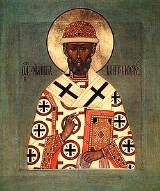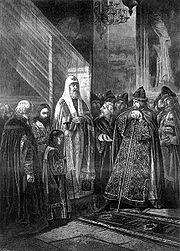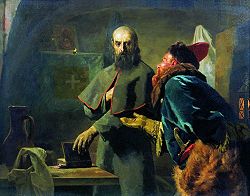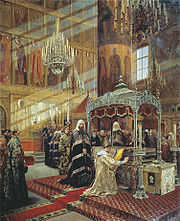
Metropolitan Philip
Encyclopedia
Saint Philip II of Moscow (11 February 1507 – 12 December 1569) was a Russian Orthodox monk
, who became Metropolitan of Moscow during the reign of Ivan the Terrible. He was one of a few Metropolitans
who dared openly to contradict royal authority, and it is widely believed that the Tsar had him murdered on that account. He is venerated as a saint
and martyr
in the Eastern Orthodox Church
.
families of Muscovy, in the city of Galich
(in present-day Kostroma Oblast
). However, according to some sources, he was born in Moscow
. Grand Prince
Vasili III
took young Theodore into the royal court
. It is said that since childhood Theodore was on friendly terms with Ivan IV of Russia
("Ivan the Terrible"). According to other accounts, he was involved in the conspiracy of Prince Andrey of Staritsa
against Elena Glinskaya
and, when their plans were discovered, he escaped to Solovetsky Monastery
on the White Sea
. Yet another account says that his decision to become a monk occurred on Sunday, June 5, 1537, while he was standing in church for the Divine Liturgy
, on hearing the words of Jesus: "No man can serve two masters" . According to this account, he secretly left Moscow dressed as a muzhik (peasant), and for a while he hid himself away from the world in the village of Khizna, near Lake Onega
, earning his livelihood as a shepherd, later joining the monastery at Solovetsk. At any rate, he entered the monastery at Solovki at the age of 30, and a year and a half later he was tonsure
d (took monastic vows), receiving the religious name
of Philip. In the monastery he worked at the iron forge
and as a baker
.
 Eleven years later, Philip was made hegumen
Eleven years later, Philip was made hegumen
(abbot) of the monastery. During his term in office, they constructed two cathedrals
, a brick-yard, many water-mills and storehouses, and a network of canals connecting 72 lakes. It is said that Philip took part in all these toils together with other monks. As a result, the monastery experienced a spiritual revival. He also adopted a new monastic Rule (Typicon) for the community. Most of Philip's projects in Solovki survive to this day.
The tsar heard about the indefatigable monk and asked him to fill the vacant metropolitan see of Moscow
. Philip agreed on condition that Ivan would abolish Oprichnina
. On June 25, 1566 Philip was consecrated a bishop
and enthroned as Metropolitan of Moscow and all Russia.
 After only two years, however, Ivan the Terrible persisted with committing murders under the aegis of Oprichnina. During Great Lent
After only two years, however, Ivan the Terrible persisted with committing murders under the aegis of Oprichnina. During Great Lent
, on the Sunday of the Veneration of the Cross, March 2, 1568, when the Tsar came to the cathedral for Divine Liturgy
, Philip refused to bless
him and publicly rebuked him for the ongoing massacre. The Massacre of Novgorod
ensued, and Philip's condemnation followed.
Ivan eventually deposed
Philip from office by raising incredible charges of sorcery
and dissolute living. Philip was arrested during Liturgy at the Cathedral of Dormition and imprisoned in a dingy cell of the Theophany (Bogoiavlenskii) Monastery, fettered with chains, with a heavy collar around his neck, and was deprived of food for a few days in succession. Then he was transferred and immured at the Monastery of the Fathers (Otroch Monastery) at Tver
. In November 1568, the tsar summoned the Holy Synod
, which had Philip deposed. A year later, on December 23, 1569, he was strangled by the Tsar's minion, Malyuta Skuratov
at Otroch, two days before Christmas
. As if aware of his approaching death, Philip had asked to receive Holy Communion three days earlier.
 After his martyr
After his martyr
dom, monks from Solovki Monastery asked for permission to transfer the body of St. Philip to their monastery. When they opened up the tomb they found the body of the hierarch was incorrupt, and various healings began to be reported. The transfer of his remains from Tver to the Solovki Monastery took place in 1590.
In 1652, Patriarch Nikon
persuaded Tsar Alexis to bring Philip's relic
s to Moscow
, where he was glorified
(proclaimed a saint
) later that same year. His memory is celebrated three times a year:
a 2009 Russian drama film directed by Pavel Lungin
.
Monk
A monk is a person who practices religious asceticism, living either alone or with any number of monks, while always maintaining some degree of physical separation from those not sharing the same purpose...
, who became Metropolitan of Moscow during the reign of Ivan the Terrible. He was one of a few Metropolitans
Metropolitan bishop
In Christian churches with episcopal polity, the rank of metropolitan bishop, or simply metropolitan, pertains to the diocesan bishop or archbishop of a metropolis; that is, the chief city of a historical Roman province, ecclesiastical province, or regional capital.Before the establishment of...
who dared openly to contradict royal authority, and it is widely believed that the Tsar had him murdered on that account. He is venerated as a saint
Saint
A saint is a holy person. In various religions, saints are people who are believed to have exceptional holiness.In Christian usage, "saint" refers to any believer who is "in Christ", and in whom Christ dwells, whether in heaven or in earth...
and martyr
Martyr
A martyr is somebody who suffers persecution and death for refusing to renounce, or accept, a belief or cause, usually religious.-Meaning:...
in the Eastern Orthodox Church
Eastern Orthodox Church
The Orthodox Church, officially called the Orthodox Catholic Church and commonly referred to as the Eastern Orthodox Church, is the second largest Christian denomination in the world, with an estimated 300 million adherents mainly in the countries of Belarus, Bulgaria, Cyprus, Georgia, Greece,...
.
Life
He was born Feodor Stepanovich Kolychev into one of the noblest boyarBoyar
A boyar, or bolyar , was a member of the highest rank of the feudal Moscovian, Kievan Rus'ian, Bulgarian, Wallachian, and Moldavian aristocracies, second only to the ruling princes , from the 10th century through the 17th century....
families of Muscovy, in the city of Galich
Galich, Russia
Galich is a town in Kostroma Oblast, Russia, situated on the southern bank of Lake Galichskoye. It is also a minor railroad node of the Trans-Siberian railway. Population: -History:...
(in present-day Kostroma Oblast
Kostroma Oblast
Kostroma Oblast is a federal subject of Russia . Its administrative center is the city of Kostroma.Major historic towns include Kostroma, Sharya, Nerekhta, Galich, Soligalich, and Makaryev. Textile industries have been developed there since the early 18th century...
). However, according to some sources, he was born in Moscow
Moscow
Moscow is the capital, the most populous city, and the most populous federal subject of Russia. The city is a major political, economic, cultural, scientific, religious, financial, educational, and transportation centre of Russia and the continent...
. Grand Prince
Grand Prince
The title grand prince or great prince ranked in honour below emperor and tsar and above a sovereign prince .Grand duke is the usual and established, though not literal, translation of these terms in English and Romance languages, which do not normally use separate words for a "prince" who reigns...
Vasili III
Vasili III of Russia
Vasili III Ivanovich was the Grand Prince of Moscow from 1505 to 1533. He was the son of Ivan III Vasiliyevich and Sophia Paleologue and was christened with the name Gavriil...
took young Theodore into the royal court
Royal court
Royal court, as distinguished from a court of law, may refer to:* The Royal Court , Timbaland's production company*Court , the household and entourage of a monarch or other ruler, the princely court...
. It is said that since childhood Theodore was on friendly terms with Ivan IV of Russia
Ivan IV of Russia
Ivan IV Vasilyevich , known in English as Ivan the Terrible , was Grand Prince of Moscow from 1533 until his death. His long reign saw the conquest of the Khanates of Kazan, Astrakhan, and Siberia, transforming Russia into a multiethnic and multiconfessional state spanning almost one billion acres,...
("Ivan the Terrible"). According to other accounts, he was involved in the conspiracy of Prince Andrey of Staritsa
Andrey of Staritsa
Andrey Ivanovich was the youngest son of Ivan the Great by Sophia of Byzantium. Since 1519, his appanages included Volokolamsk and Staritsa....
against Elena Glinskaya
Elena Glinskaya
Elena Vasilyevna Glinskaya April 1538, Moscow) was the second wife of Grand Prince Vasili III and regent of Russia for 5 years .- Background :...
and, when their plans were discovered, he escaped to Solovetsky Monastery
Solovetsky Monastery
Solovetsky Monastery was the greatest citadel of Christianity in the Russian North before being turned into a special Soviet prison and labor camp , which served as a prototype for the GULag system. Situated on the Solovetsky Islands in the White Sea, the monastery braved many changes of fortune...
on the White Sea
White Sea
The White Sea is a southern inlet of the Barents Sea located on the northwest coast of Russia. It is surrounded by Karelia to the west, the Kola Peninsula to the north, and the Kanin Peninsula to the northeast. The whole of the White Sea is under Russian sovereignty and considered to be part of...
. Yet another account says that his decision to become a monk occurred on Sunday, June 5, 1537, while he was standing in church for the Divine Liturgy
Divine Liturgy
Divine Liturgy is the common term for the Eucharistic service of the Byzantine tradition of Christian liturgy. As such, it is used in the Eastern Orthodox and Eastern Catholic Churches. Armenian Christians, both of the Armenian Apostolic Church and of the Armenian Catholic Church, use the same term...
, on hearing the words of Jesus: "No man can serve two masters" . According to this account, he secretly left Moscow dressed as a muzhik (peasant), and for a while he hid himself away from the world in the village of Khizna, near Lake Onega
Lake Onega
Lake Onega is a lake in the north-west European part of Russia, located on the territory of Republic of Karelia, Leningrad Oblast and Vologda Oblast. It belongs to the basin of Baltic Sea, Atlantic Ocean, and is the second largest lake in Europe after Lake Ladoga...
, earning his livelihood as a shepherd, later joining the monastery at Solovetsk. At any rate, he entered the monastery at Solovki at the age of 30, and a year and a half later he was tonsure
Tonsure
Tonsure is the traditional practice of Christian churches of cutting or shaving the hair from the scalp of clerics, monastics, and, in the Eastern Orthodox Church, all baptized members...
d (took monastic vows), receiving the religious name
Religious Name
A religious name is a type of given name bestowed for a religious purpose, and which is generally used in religious contexts. Different types of religious names may be in use among the clergy of a religion, as well in some cases among the laity....
of Philip. In the monastery he worked at the iron forge
Forge
A forge is a hearth used for forging. The term "forge" can also refer to the workplace of a smith or a blacksmith, although the term smithy is then more commonly used.The basic smithy contains a forge, also known as a hearth, for heating metals...
and as a baker
Baker
A baker is someone who bakes and sells bread, Cakes and similar foods may also be produced, as the traditional boundaries between what is produced by a baker as opposed to a pastry chef have blurred in recent decades...
.

Hegumen
Hegumen, hegumenos, igumen, or ihumen is the title for the head of a monastery of the Eastern Orthodox Church or Eastern Catholic Churches, similar to the one of abbot. The head of a convent of nuns is called hegumenia or ihumenia . The term means "the one who is in charge", "the leader" in...
(abbot) of the monastery. During his term in office, they constructed two cathedrals
Catholicon
Catholicon may refer to:* Catholicon, the conventual church at the centre of an abbey* Katholikon, the primary church in an Orthodox or Eastern Catholic monastery* Catholicon , part of the Holy Liturgy of Mor Yakub of the Syriac Orthodox Church...
, a brick-yard, many water-mills and storehouses, and a network of canals connecting 72 lakes. It is said that Philip took part in all these toils together with other monks. As a result, the monastery experienced a spiritual revival. He also adopted a new monastic Rule (Typicon) for the community. Most of Philip's projects in Solovki survive to this day.
The tsar heard about the indefatigable monk and asked him to fill the vacant metropolitan see of Moscow
Moscow
Moscow is the capital, the most populous city, and the most populous federal subject of Russia. The city is a major political, economic, cultural, scientific, religious, financial, educational, and transportation centre of Russia and the continent...
. Philip agreed on condition that Ivan would abolish Oprichnina
Oprichnina
The oprichnina is the period of Russian history between Tsar Ivan the Terrible's 1565 initiation and his 1572 disbanding of a domestic policy of secret police, mass repressions, public executions, and confiscation of land from Russian aristocrats...
. On June 25, 1566 Philip was consecrated a bishop
Bishop
A bishop is an ordained or consecrated member of the Christian clergy who is generally entrusted with a position of authority and oversight. Within the Catholic Church, Eastern Orthodox, Oriental Orthodox Churches, in the Assyrian Church of the East, in the Independent Catholic Churches, and in the...
and enthroned as Metropolitan of Moscow and all Russia.

Great Lent
Great Lent, or the Great Fast, is the most important fasting season in the church year in Eastern Christianity, which prepares Christians for the greatest feast of the church year, Pascha . In many ways Great Lent is similar to Lent in Western Christianity...
, on the Sunday of the Veneration of the Cross, March 2, 1568, when the Tsar came to the cathedral for Divine Liturgy
Divine Liturgy
Divine Liturgy is the common term for the Eucharistic service of the Byzantine tradition of Christian liturgy. As such, it is used in the Eastern Orthodox and Eastern Catholic Churches. Armenian Christians, both of the Armenian Apostolic Church and of the Armenian Catholic Church, use the same term...
, Philip refused to bless
Bless
Bless may refer to:* Blessing, a religious pronouncement* Bless , hip-hop artist from Montreal* "Bless" , a 2010 single by L'Arc-en-Ciel* Bless, another name for the Swedish group Bubbles* Bless , an album by Bubbles...
him and publicly rebuked him for the ongoing massacre. The Massacre of Novgorod
Massacre of Novgorod
The Massacre of Novgorod was an attack launched by Tsar Ivan IV’s oprichniki on the city of Novgorod, Russia in 1570. The sheer number of casualties combined with the extreme level of violent cruelty makes this campaign possibly the most vicious in the brutal legacy of the oprichnina.-Paranoia,...
ensued, and Philip's condemnation followed.
Ivan eventually deposed
Deposition (politics)
Deposition by political means concerns the removal of a politician or monarch. It may be done by coup, impeachment, invasion or forced abdication...
Philip from office by raising incredible charges of sorcery
Magic (paranormal)
Magic is the claimed art of manipulating aspects of reality either by supernatural means or through knowledge of occult laws unknown to science. It is in contrast to science, in that science does not accept anything not subject to either direct or indirect observation, and subject to logical...
and dissolute living. Philip was arrested during Liturgy at the Cathedral of Dormition and imprisoned in a dingy cell of the Theophany (Bogoiavlenskii) Monastery, fettered with chains, with a heavy collar around his neck, and was deprived of food for a few days in succession. Then he was transferred and immured at the Monastery of the Fathers (Otroch Monastery) at Tver
Tver
Tver is a city and the administrative center of Tver Oblast, Russia. Population: 403,726 ; 408,903 ;...
. In November 1568, the tsar summoned the Holy Synod
Holy Synod
In several of the autocephalous Eastern Orthodox churches and Eastern Catholic Churches, the patriarch or head bishop is elected by a group of bishops called the Holy Synod...
, which had Philip deposed. A year later, on December 23, 1569, he was strangled by the Tsar's minion, Malyuta Skuratov
Malyuta Skuratov
Grigory Lukyanovich Skuratov-Belskiy , better known as Malyuta Skuratov was one of the most odious leaders of the Oprichnina during the reign of Ivan the Terrible....
at Otroch, two days before Christmas
Christmas
Christmas or Christmas Day is an annual holiday generally celebrated on December 25 by billions of people around the world. It is a Christian feast that commemorates the birth of Jesus Christ, liturgically closing the Advent season and initiating the season of Christmastide, which lasts twelve days...
. As if aware of his approaching death, Philip had asked to receive Holy Communion three days earlier.
Commemoration as a saint

Martyr
A martyr is somebody who suffers persecution and death for refusing to renounce, or accept, a belief or cause, usually religious.-Meaning:...
dom, monks from Solovki Monastery asked for permission to transfer the body of St. Philip to their monastery. When they opened up the tomb they found the body of the hierarch was incorrupt, and various healings began to be reported. The transfer of his remains from Tver to the Solovki Monastery took place in 1590.
In 1652, Patriarch Nikon
Patriarch Nikon
Nikon , born Nikita Minin , was the seventh patriarch of the Russian Orthodox Church...
persuaded Tsar Alexis to bring Philip's relic
Relic
In religion, a relic is a part of the body of a saint or a venerated person, or else another type of ancient religious object, carefully preserved for purposes of veneration or as a tangible memorial...
s to Moscow
Moscow
Moscow is the capital, the most populous city, and the most populous federal subject of Russia. The city is a major political, economic, cultural, scientific, religious, financial, educational, and transportation centre of Russia and the continent...
, where he was glorified
Canonization
Canonization is the act by which a Christian church declares a deceased person to be a saint, upon which declaration the person is included in the canon, or list, of recognized saints. Originally, individuals were recognized as saints without any formal process...
(proclaimed a saint
Saint
A saint is a holy person. In various religions, saints are people who are believed to have exceptional holiness.In Christian usage, "saint" refers to any believer who is "in Christ", and in whom Christ dwells, whether in heaven or in earth...
) later that same year. His memory is celebrated three times a year:
- His main feast day falls on January 9 (for those churches which follow the traditional Julian CalendarJulian calendarThe Julian calendar began in 45 BC as a reform of the Roman calendar by Julius Caesar. It was chosen after consultation with the astronomer Sosigenes of Alexandria and was probably designed to approximate the tropical year .The Julian calendar has a regular year of 365 days divided into 12 months...
, January 9 falls on January 22 of the modern Gregorian CalendarGregorian calendarThe Gregorian calendar, also known as the Western calendar, or Christian calendar, is the internationally accepted civil calendar. It was introduced by Pope Gregory XIII, after whom the calendar was named, by a decree signed on 24 February 1582, a papal bull known by its opening words Inter...
). - The feast of the translationTranslation (relics)In Christianity, the translation of relics is the removal of holy objects from one locality to another ; usually only the movement of the remains of the saint's body would be treated so formally, with secondary relics such as items of clothing treated with less ceremony...
of his relics is celebrated on July 3 (July 16). - On October 5 (October 18) he is celebrated as one of the Hierarchs of Moscow. The celebration of a special day (SynaxisSynaxisIn Eastern Christianity , a Synaxis is an assembly for liturgical purposes, generally through the celebration of Vespers, Matins, Little Hours, and the Divine Liturgy....
) to honor Saints PeterMetropolitan PeterSaint Peter, Metropolitan of Moscow and all Russia was the Russian metropolitan who moved his see from Vladimir to Moscow in 1325. Later he was proclaimed a patron saint of Moscow. In spite of the move, the office remained officially entitled "Metropolitan of Kiev and All Rus'" until the...
, AlexisAlexius, Metropolitan of MoscowSaint Alexius was Metropolitan of Kiev and all Russia , and presided over the Moscow government during Dmitrii Donskoi's minority....
, and Jonah as "Metropolitans and Wonderworkers of All Russia" was established by Patriarch Job in 1596. In 1875, St. Innocent, Metropolitan of MoscowInnocent of AlaskaSaint Innocent of Alaska , also known as Saint Innocent of Moscow was a Russian Orthodox priest, bishop, archbishop and Metropolitan of Moscow and all Russia. He is known for his missionary work, scholarship and leadership in Alaska and the Russian Far East during the 19th century...
proposed that St. Philip be included with the others.
Appearances in modern media
Tsar (film)Tsar (film)
Tsar is a 2009 Russian drama film directed by Pavel Lungin. It competed in the Un Certain Regard section at the 2009 Cannes Film Festival.-Cast:*Pyotr Mamonov - Ivan The Terrible*Oleg Yankovskiy - Metropolitan Philip Kolychev...
a 2009 Russian drama film directed by Pavel Lungin
Pavel Lungin
Pavel Semyonovich Lungin is a Russian film director. He is sometimes credited as Pavel Loungine .Born July 12, 1949 in Moscow, Lungin is the son of a scriptwriter and philologist. He later attended Moscow State University from which he graduated in 1971...
.
External links
- Hieromartyr Philip the Metropolitan of Moscow and All Russia Orthodox iconIconAn icon is a religious work of art, most commonly a painting, from Eastern Christianity and in certain Eastern Catholic churches...
and synaxarion for January 9 - Translation of the relics of Hieromartyr Philip the Metropolitan of Moscow July 3
- Synaxis of the Hierarchs of Moscow October 5
- Translation of the Relics of our Father among the Saints Metropolitan Philip

